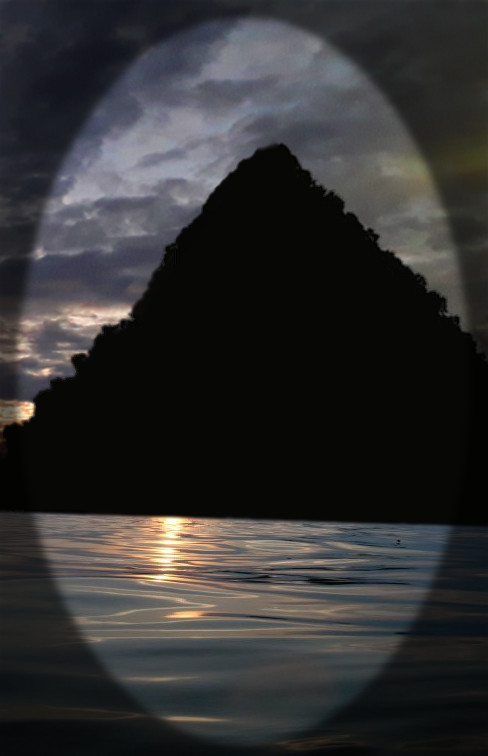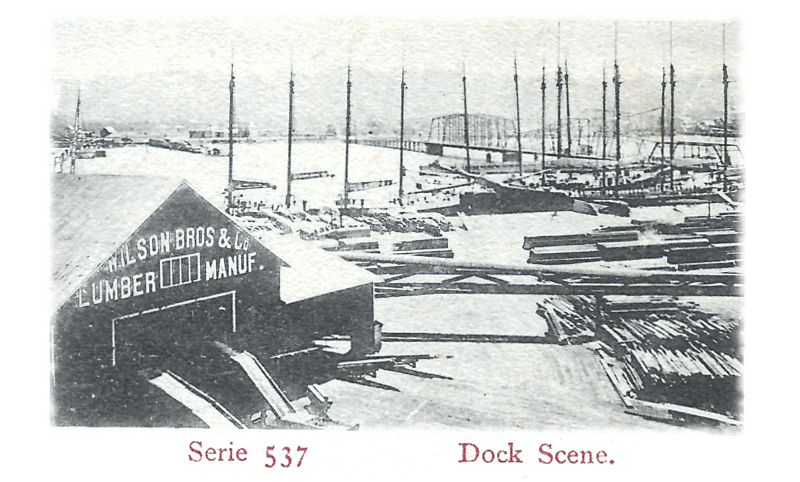
The exact location of Round River has never
been found. This photograph, long believed to show Paul Bunyan's pyramid
forty many years later, was captured by a hiker having been lost for
seventeen days in the Northwoods. Yet no one has ever since been able to
return to the site.
EVER HERO HAS GOT THAT BIG MOMENT. Y'know, some great test through courage or dumb luck what they come out on top or not at all. St. George got a dragon, Perseus got Medusa, John Henry got a steam drill and Paul what y'think he got? Well, he got a round river is what he got.
Now, I know that don't sound half bad, but, boy, you don't know the half of it! So, lumberjacks, come winter, they chop down trees, see, what they do, and after those trees fall and all, they are loaded on a big sled and all, the oxen, those are the ones that go and pulled them to the riverside and all. Now, come spring, the logs are floated down river to the saw mills, see. And, it's like this—
Ain't nothin' more frustration to a lumberjack than a river that goes nowhere. No end, means you're not gettin' no timber to no saw mill, and, just like that, all that hard work, well, it don't amount to nothin'.
The interestin' thing 'bout the round river is that right there in the middle stood a forty acre lot full of timber. But this weren't no ordinary forty, no sir, the forty was shaped just like a pyramid, a separate track of timber on each side. See, while most loggin' camps, what they do, just log a forty track off flat. But Paul, shucks, not only did he get the top but all four sides too. One-hundred million feet of timber all on a single forty.
Back to the problem though, it was sure a right difficult one. If'n Paul couldn't drive those logs down river to the saw mills, then how is he goin' to get paid for all that work? Well, that's just it, ain't it— he just 'bout nearly didn't. Paul and his mighty crew, they go and float those logs downstream. But the thing about it is that they keep seein' camps and pyramid-shaped lots what look just like theirs! Paul, he gets right flustered, for sure. It was like this:
“At Round River, in section 37, there was a forty shaped like a pyramid, with a heavy growth of timber on all of its sides. To see to the top ’took a week.‘ It was ‘as far as twenty men could see.’ Bunyan and his crew labored all one winter, ‘the winter of the blue snow,’ to clear it. From It they cut one hundred million feet of timber. Some of the men got one short leg from working all winter on one side of the slope. ... The crew rolled logs cut on the pyramid on the pyramid forty down to the bank and in the spring started them down the river. They drove for ‘two weeks or more’ hoping to reach a mill town where they could dispose of them. It was not until they had passed their camp several times that they realized the river was round and had no outlet. Someone recognized the pyramid.”
— Charles E. Brown, “American Folklore Paul Bunyan Tales”

“I used to work for Paul quite a good bit, he used to get up and say, see? I used to work for Paul says, and one time, says, Paul mu' [must] gotta big track of timber. He went up and, and look at this here track over and built, they built their camp, but they went round to—seen a big stream of water there and didn't go around.
Well, he bought this timber and the reason why this here timber stayed in there is, because it was such a long ways, some days, to get it out to a stream!
Well, Paul, he, he didn't look round t' [to] see what he was buyin', and he bought this timber quite cheap at that time. He said that they went up there and made a mess of camps and everything, and they worked there all winter and put in, [audio static] hired this crew, it started to dry.
Well, finally when they started. ...
Well, he started to drive those logs out, then they drove two weeks, and, finally, they came right straight back ... drove two weeks, and, uh, the, they run onto some camps that look, head fellas they run on some camps there that look like, why, they worked all winter these boys, y'see?
.... said ‘Well, Paul here are some camps that look, ... the camp resembles our camp, your camp, yes.’ And, we drove two weeks more, hardly a day went right on, come right back to our same place again. Now with this camps again.
Well, then they got out, and discovered, and found out that, h—ll, they'd been drivin' there for four weeks with seventy, eighty, a hundred men on that drive, and paying 'em good wages, and workin' like that. ... Well, Paul says, ‘Well, now we're at an awful fix.’ He said, ‘The, uh, we'll investigate this.’ So, they went around-and-around, and they couldn't found no, find no, inlet nor outlet to that lake. It was a lake. It wa-[was]—instead of a river— it was a lake.
Well, he didn't know what in the world to do, worked out all winter, spent about all he had, and he didn't know what in the world to do, and, so, he had, he had wind of that awful cold winter, when he had that blue ox, and, that blue ox is one of the stoutest animals that ever was hitched up ... then he went to look and see if he could get an outlet, or from this here.
Well, it was pretty close to a half a mile of a canal to dig, if he got it out to outlet ... to a river, could put his logs through if he, if get that outlet right. Well, then he could drive his logs through there and take them to mills.
So, he look, finally, he heard of a big cow drove one of the biggest, 'bout the biggest cow in the world. For there, he went and got her. Gave a hundred and fifty dollars for this cow ... he took men, and they plowed it, [the earth with the cow] and scrapped this [canal] right out, work it right out there, some frost on the ground, but they just got that right out there in no time at all, and they got it through, and they drove their logs through, without, uh um, to the river. And, then they— they was alright.
So, they had to do that save what he, [Paul] or he loss all he had, y'see? ”
— Bill McBride in interview with Alan Lomax, August 22, 1938, Mount Pleasant, Michigan
The moral to this story? It is this. Paul, he went around in circles but eventually realized it. Many can't claim the same. Paul, he was sitting on the verge of success but with no way to get there. But when Paul didn't have a way what did he do? I'll tell ya' what he did, the only logically thing he could think of—
He went and got the biggest cow in the world, he ploughed a canal and he moved the earth.
Now, that was a Paul Bunyan problem, what required a Paul Bunyan solution. Just as a you problem requires a you solution.
In short, Paul went ahead and made a path all his own is what he did. See, oftentimes, the best paths in life are the ones we create for ourselves. Paul, he had to think out of the box, bring in some help, that big cow what not, and sometimes that's how it is. Sometimes, in this big world of ours, you just gotta realize you're goin' in circles, and the reason you can't find no way out is 'cause you ain't made one yet. You might well have to move the earth too. It might right be hard but nothin' is impossible, see?
And, maybe you can't go it alone, but the first step is yours, and ain't nobody gonna take that step for you but you.
* * *
TALES
“'Twas '64 or '65
We drove the great Round River Drive;
'Twas '65 or '64-
Yes, it was durin' of the war,
Or it was after or before.
Those were the days in Michigan,
The good old days, when any man
Could cut and skid and log and haul,
And there was pine enough for all.
Then all the logger had to do
Was find some timber that was new
Besides a stream-he knew it ran
To Huron or to Michigan,
That at the mouth a mill there was
To take the timber for the saws.
(In those old days the pioneer
He need not read his title clear
To mansions there or timber here.)
Paul Bunyan, (you have heard of Paul?
He was the king pin of 'em all,
The greatest logger in the land;
He had a punch in either hand
And licked more men and drove more miles
And got more drunk in more new styles
Than any other peavey prince
Before, or then, or ever since.)
Paul Bunyan bossed that famous crew:
A bunch of shoutin' bruisers, too-
Black Dan MacDonald, Tom McCann,
Dutch Jake, Red Murphy, Dirty Dan,
And other Dans from black to red,
With Curley Charley, yellow-head,
And Patsy Ward, from off the Clam-
The kind of gang to break a jam,
To clean a bar or rassle rum,
Or give a twenty to a bum.”
— Douglas Malloch & James MacGillivray,
“Round River Drive”
We drove the great Round River Drive;
'Twas '65 or '64-
Yes, it was durin' of the war,
Or it was after or before.
Those were the days in Michigan,
The good old days, when any man
Could cut and skid and log and haul,
And there was pine enough for all.
Then all the logger had to do
Was find some timber that was new
Besides a stream-he knew it ran
To Huron or to Michigan,
That at the mouth a mill there was
To take the timber for the saws.
(In those old days the pioneer
He need not read his title clear
To mansions there or timber here.)
Paul Bunyan, (you have heard of Paul?
He was the king pin of 'em all,
The greatest logger in the land;
He had a punch in either hand
And licked more men and drove more miles
And got more drunk in more new styles
Than any other peavey prince
Before, or then, or ever since.)
Paul Bunyan bossed that famous crew:
A bunch of shoutin' bruisers, too-
Black Dan MacDonald, Tom McCann,
Dutch Jake, Red Murphy, Dirty Dan,
And other Dans from black to red,
With Curley Charley, yellow-head,
And Patsy Ward, from off the Clam-
The kind of gang to break a jam,
To clean a bar or rassle rum,
Or give a twenty to a bum.”
— Douglas Malloch & James MacGillivray,
“Round River Drive”
[ DISCLOSURE: THE FOLLOWING IS REAL!—believe me—READER INDISCRETION IS ADVISED! ]
NEXT! ☞
☜ BACK?